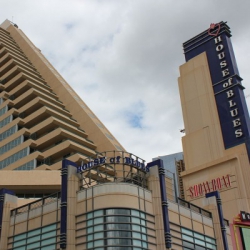Caesars Entertainment Corp. announced on Saturday it will close the Showboat Casino in Atlantic City after a sustained decline in revenues. Caesars, the largest operator of U.S. casinos, currently owns four of the eleven casinos operating in Atlantic City.
Caesars Entertainment faces a troubling debt situation, as the gaming company has over $23 billion in debt at present. In March 2014, CEO Gary Loveman announced the closing of Harrah’s Casino in Tunica, laying off over 1,000 workers at that facility. The news for New Jersey’s resort city has paralleled the bleak financial news for Tunica County these past few years.
Gary Loveman Hopes to Stabilize the Local Businesses
Gary Loveman released a statement on Friday, saying, “We believe this is a necessary step to help stabilize our business in Atlantic City and support the viability of our remaining operations in the vicinity.” Loveman announced August 31 would be the effective closing date for the Showboat.
Caesars Entertainment’s Debt Situation
Caesars is currently attempting to rearrange assets in order to service debt and generate more revenue. Gary Loveman’s company has sold asset and closed down properties. Caesars has transferred properties to other units, such as the Caesars Growth Partners and Caesars Interactive. The company has refinanced loans and sold equity, all hoping to meet a mounting debt concern.
The company’s debt stems from a leveraged buyout in January 2008, when Apollo Global Management and TPG Capital used over $30 billion to seize control of Harrah’s Entertainment, as the company then was known. That came less than a year before the collapse of the American real estate market and the subsequent global recession.
How a Company Goes into Debt
Faced with an entirely new (and fading) market, Caesars Entertainment could not grow out of the debt spending it had assumed in the buyout. The corporation focused on the American market, while its three major American rivals (Las Vegas Sands, MGM Resorts, Wynn Resorts) all focused on their Asian properties, especially their integrated casinos in Macau. As Macau has become the richest gambling destination in the world, Caesars has been left behind its rivals.
American Gaming Industry Woes
As the gaming company with the most U.S. assets, Caesars Entertainment in many ways mirrors the troubles the American gaming industry faces at the moment. Rapid expansion and too much investment in the pre-recession is coming back to haunt the industry, too.
In the northeast and the midwest, American casinos are facing market saturation and a U.S. public less willing to spend on slot machines. While Las Vegas remains strong enough, most of the other traditional American bastions of gaming are facing tough times. Because Caesars Entertainment Corporation is invested in more of these regions than any other company, it naturally is a microcosm of a wider issue.
Fitch Ratings Approves of the Closing
When the closing was announced on Friday, Alex Bumazhny of Fitch Ratings released a statement which said, “The closure makes financial sense for Caesars and is a positive for the oversupplied Atlantic City market.”
While the closing makes sense from a market perspective, over a thousand Atlantic City residents have lost their jobs. For the first time in its history, Atlantic City has seen casinos close due to broad market considerations in the past year. In January 2014, the Atlantic Club (formerly Atlantic City Hilton) closed its doors. The Atlantic Club was bought by Caesars Entertainment and the Tropicana, who decided to close the property to help the saturated market. The companies divided the Atlantic Club’s assets. Now the Showboat will be closed.
Atlantic City Casino Closings
Last week, a third Atlantic City casino annouced it might close its doors, too. The Revel Casino, which declared bankruptcy recently, is seeking a new ownership group. If no new owners present themselves by August 18, the Revel Casino will close its doors. That would leave Atlantic City with only 9 casinos by September 1, 2014.
Such a situation is a disaster for the U.S. gambling industry, but also several other groups. Workers in Atlantic City will see a depressed job market. Atlantic City itself will have a smaller tax base, both in businesses taxes from the casinos and the residential taxes from employed workers. Also, the state of New Jersey will receive fewer gaming revenues. This is why the Division of Gaming Enforcement and Governor Chris Christie have sought to help Atlantic City initiatives with such issues as sports betting and online gambling.

